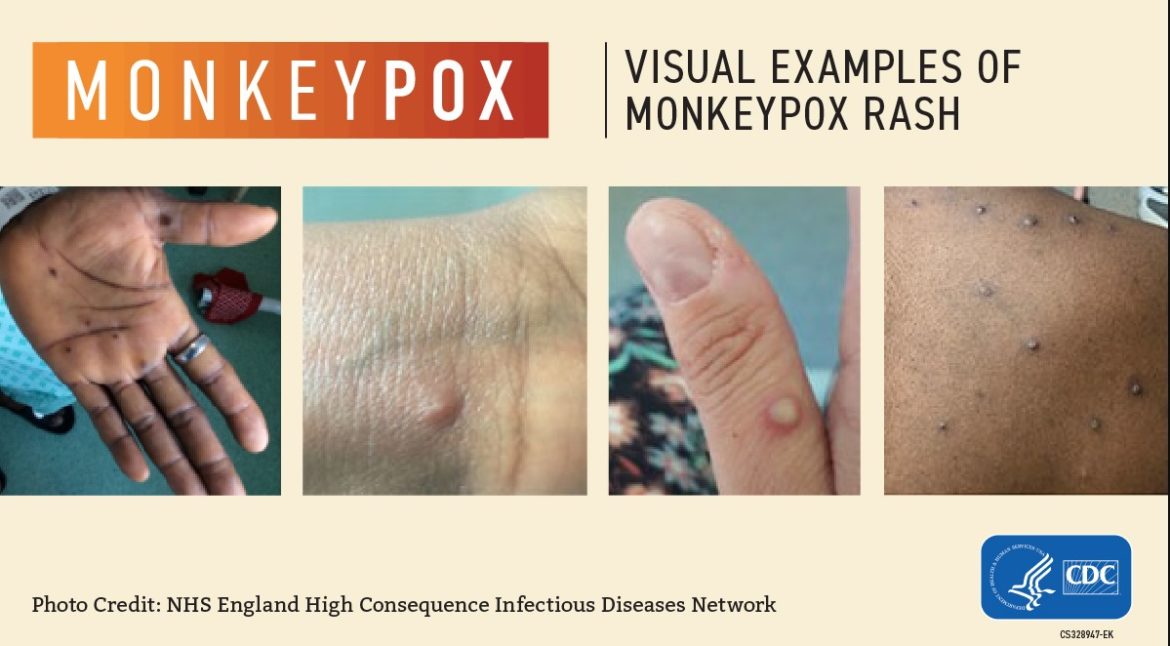CONCORD – There have been 14 cases of monkeypox reported in New Hampshire so far and President Biden on Thursday declared the outbreak around the country a national emergency.
Laura Montenegro, spokesman for the Department of Health and Human Services, said the Centers for Disease Control has allocated monkeypox vaccine based on number of cases.
The New York Times reported Friday that a shortfall of monkeypox vaccine is causing concern.
The Times said the vaccine, called Jynneos, is approved to have two doses, but most people at risk of infection have been receiving one dose — if they can find it.
“Now the shortage has led federal officials to consider a rarely used approach: a so-called dose-sparing strategy, which gives shots that each contain just one-fifth of a single dose,” the Times reported.
To date, New Hampshire has received a total of 327 doses of the Jynneos vaccine, Montenegro said. The CDC recently announced phase 3 vaccine rollout and has allocated New Hampshire an additional 1,140 doses which will arrive in three shipments.
The first should arrive soon and includes 460 doses, Montenegro said. “This will allow us to begin expanding vaccination from known exposures (PEP – post-exposure prophylaxis) to include highest-risk individuals (PrEP – Pre-exposure prophylaxis) within the next couple weeks,” Montenegro said.
A new hotline has been established by Dartmouth Health to address questions about the disease, according to a news release.
Monkeypox is an infectious viral disease that causes skin lesions, often preceded or followed by influenza-like symptoms, with possible complications including significant scarring, secondary infections, pneumonia, sepsis, encephalitis, and loss of vision with severe eye infection, the release said. The current outbreak began in May and the disease was first detected in New Hampshire in late June.
To address concerns from the public about monkeypox, Dartmouth Health has established a hotline to answer general questions about the disease.
The hotline number is 603-650-1818 and it is operational Monday-Friday from 7 a.m. to 5 p.m. and Saturday from 8 a.m. to 12 p.m. The hotline is closed on Sundays.
The release included the following information: If you believe you have come into contact with or contracted monkeypox, you may call the Dartmouth Health hotline for information, and you should isolate at home and contact your primary care provider to determine next steps with respect to your care. Visiting an emergency department immediately is not recommended.
“The Centers for Disease Control and Prevention recommends that people with monkeypox remain isolated at home or at another location for the duration of illness, but that might not be possible in all situations,” said Jessica L. Swain, MBA, MLT, CIC, director of Infection Prevention and Control at Dartmouth Health. “Prioritizing isolation and source control strategies helps prevent transmission while balancing the impact of this infection on the daily lives of people diagnosed with monkeypox.”
Monkeypox is spread through close contact that may include sexual/intimate activity; direct contact with monkeypox rash, scabs, or body fluids from a person with monkeypox; scratches/bites from an infected animal, or preparing or eating meat or using products from an infected animal; touching objects, fabrics (clothing, bedding, or towels), and surfaces that have been used by someone with monkeypox; or contact with respiratory secretions such as saliva from someone with monkeypox coming in contact with someone’s eye or mouth. Being in a room with someone with monkeypox without the above exposures is low risk for transmission, especially if for less than three hours and/or greater than six feet away. Symptoms may include: fever, headache, muscle aches and backache, swollen lymph nodes, chills, exhaustion, respiratory symptoms (e.g. sore throat, nasal congestion, or cough).
A rash that may be located on or near the genitals or anus, but could also be on other areas like the hands, feet, chest, face, or mouth.
The rash will go through several stages, including scabs, before healing.
The rash can look like pimples or blisters and may be painful or itchy.
Infections with the type of monkeypox identified in the current outbreak are rarely fatal, but can be more dangerous for people with immunodeficiency and/or comorbidities. The risk level for children and pregnant people is unknown, and monkeypox may be passed from a pregnant person to a fetus.
For more information on monkeypox, visit:
CDC: https://www.cdc.gov/poxvirus/monkeypox/index.html
New Hampshire Department of Health and Human Services: https://www.dhhs.nh.gov/programs-services/disease-prevention/infectious-disease-control/monkeypox
Vermont Department of Health: https://www.healthvermont.gov/disease-control/zoonotic-diseases/human-monkeypox-virus-hmpxv
Massachusetts Department of Public Health: https://www.mass.gov/monkeypox





